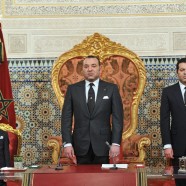Notes: Morocco’s Constitution, a Royal Trickery
1. In the 2007 general election, official turnout was 37 percent. Back to article
2. Professor Abdeltif Menouni once explained, in a periodical published by Mohammed V University in Rabat, that “royal prerogative” means “the monarch’s discretionary privilege to act for the good of the country in the absence of constitutional provisions or by his personal interpretation of any.” See his essay “Le recours `a l’article 19, une nouvelle lecture de la Constitution?” Revue juridique, politique et économique du Maroc, January 1984, 42. Back to article
3. As of this writing in December 2011, the government has not yet released the official English-language version of the new constitution. My discussion relates to the Arabic and French versions, the latter of which is available at www.sgg.gov.ma/BO/bulletin/ FR/2011/BO_5964-Bis_Fr.pdf. All translations are my own. Back to article
4. To cite only the boldest, Articles 220, 222, 489, and 490 of the Penal Code prohibit anyone from even affirming—much less preaching or acting in accord with—any religious beliefs (including agnosticism and atheism) other than those of Islam. The Code also forbids homosexual relations, as well as sexual relations between individuals of opposite sexes who are not religiously married. All the above offenses are punishable by imprisonment. Back to article
5. In transliterated form, the Arabic text of Article 46 reads: “Chakhs al malik la tuntahaku hurmatuh, wa lil malik wajib al ihtiram wa tawqeer.” Back to article
6. The ceremony of tajdid al walae (renewal of loyalty) is an annual reminder that the king’s legitimacy stems first and foremost from the bey’a—the traditional pledge of allegiance that deems him the “lieutenant of God on his land.” Hassan II realized that straightforward absolutism would not work in the modern age, so he nominally “constitutionalized” royal authority by writing extremely broad royal powers into the 1962 Constitution’s Article 19. When the February 20 demonstrations broke out in 2011, one of their main demands called for this article’s repeal. This has not really happened: The powers are still there, reinforced, expanded, and reorganized into Articles 41 and 42 of the new basic law. Back to article
7. This is documented through the late 1980s by Mohamed Achergui, cited in Rachida Cherifi’s book Le Makhzen politique au Maroc (Casablanca: Afrique Orient, 1988). No more recent study is available, but it stands to reason that most laws still come from royal decrees since both the king’s privileges and the organic law covering Parliament have remained materially unchanged since the 1980s. Back to article
8. This way comes complete with a “rent system” that spreads corruption throughout the whole length and breadth of the political world. In Morocco, many lucrative activities (transportation, the commercial exploitation of sandpits or stone pits, big-game fishing, and the like) can be carried out only with state permits, which the royal palace hands out on a discretionary basis in order to reward its clients. King Hassan took particular pains to involve all the politicians he could with this rent system, so that he could retain permanent leverage over them. This continues today on an even wider scale. Back to article
9. In March 2011, the constitutional-reform commission asked all parties to submit their views. Most of these submissions barely differed from the status quo, and in some respects were less bold even than those proposed by the king himself. Back to article
10. After the July 1 referendum, French president Nicolas Sarkozy saluted Morocco’s “exemplary process,” while Foreign Minister Alain Juppé hailed the “clear and historic decision of the people of Morocco.” Back to article
11. Fareed Zakaria, “Why There’s No Turning Back in the Middle East,” Time, 17 February 2011. Back to article
12. Susi Dennison, Nicu Popescu, and José Ignacio Torreblanca, “A Chance to Reform: How the EU Can Support Democratic Evolution in Morocco,” European Council on Foreign Relations, May 2011, 3. Available at www.ecfr.eu/page/-/ECFR33_MOROCCO_BRIEF(1).pdf. Back to article
13. Personal e-mail communication to author, September 2011. Back to article







Glad to read you again!!